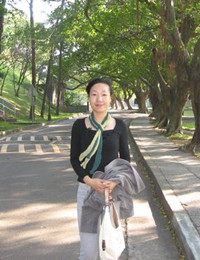科学哲学教研室




Zhu Jing
Associate Professor
E-mail:jzhu@philo.ecnu.edu.cn
2008 Ph. D. History of Science, Peking University
2007 Overseas Exchange Students, History of Science, Tshinghua University (in Taiwan)
2003 B. S. Chemistry, Central China Normal University
2015 ~ 2016, Visiting Scholar, University of Pennsylvania
2012 ~ Present, Associate Professor, Department of Philosophy, East China Normal University
2008 ~ 2012, Assistant Professor, Department of Philosophy, East China Normal University
History of Chemistry and Medicine, Philosophy of Science, Cognitive History, Public Understanding of Science
Introduction to History of Science
Topics in Sociology of Science
Scientific Thoughts and Methods
Journal articles published in English
Jing Zhu (2018). “Elixir, Urine and Hormone: A Socio-cultural History of Qiushi (Autumn Mineral),” East Asian Science, Technology, and Medicine, 47, 19-54.
Jing Zhu, Dingcheng Ren (2016). “Arsenic Prepared by Chinese Alchemist-pharmacists,” Science China Life Sciences, 59 (10): 1086-1089.
Mingwu Ding, Shangjun Yang, Jing Zhu (2004). “New efficient synthesis of 2-substituted 5,6,7,8-tetrahydro-benzothieno[2,3-d]pyrimidin -4(3H)-ones,” Synthesis-Stuttgart, (1): 75-79.
Mingwu Ding, Jing Zhu, Sufang Shi, Xiaopeng Liu (2002). “New Facile Synthesis of 2-Aroloxy-5-(2-fururylidene)-4H-imidazoline-4-ones,” Chinese Chemical Letters, 13(10): 942-944.
Journal articles published in Chinese
Jing Zhu (2018). “Chinese Medicine in Practice: An Approach to Sociology of Knowledge,” Studies in Philosophy of Science and Technology, 35(6): 116-122.
Jing Zhu (2018). “Artificial Intelligence Medicine and Philosophy of Complex Systems,” Philosophical Analysis, 9(5): 27-37.
Jing Zhu, Qing Ye (2016). “The Scientific Dimension on the Theory of Resonance Controversies,” Studies in Dialectics of Nature, 32(6): 70-75.
Lixin Dai, Kuiling Ding, Jing Zhu (2015). “From Synthesizing Crystalline Bovine Insulin to Synthesizing Our Future,” Chinese Bulletin of Life Sciences, 27(6): 676-680.
Jing Zhu (2014). “Qiushi, a Non-aphrodisiac: Medical, Social and Cultural History of the Function and Practice of Qiushi,” Journal of Dialectics of Nature 36. 6:38-43.
Jing Zhu (2014). “A Study on Innovation Methods of all the Nobel Prize Laureates in Chemistry,” Studies in Science of Science, 32(10): 1461-1467.
Jing Zhu (2013). “The Approach Change for Chinese alchemy Studies: from Protochemistry to the Context in the Society, Culture and Cognition,” Studies in Philosophy of Science and Technology, 30(4): 71-76.
Jing Zhu (2009). “Cognitive Styles and Theories in Chinese alchemy,” Journal of Shanxi University, 32(5): 134-138.
Jing Zhu, Dingcheng Ren (2008). “Historical Review and Experimental Reexamination of the Preparation of Elemental Arsenic by Europeans,” History of Natural Science, 27(2): 151-165.
Jing Zhu (2008). “A History of the Introduction and Improvement of Gunpowder and Firearms in Ancient Korea,” Dongjiang Journal, 23(1): 35-42.
Korea Foundation Fellowship, 2005, awarded by Korean Foundation for foreign scholars and professional researchers
Fellow of the Stanford Program in Beijing, 2006, awarded by Stanford University
Dharma Drum Humanities and Social Improvement Foundation Fellowship, 2006, awarded for researchers
Overseas Exchange Fellowship, 2007, awarded by Mainland Affairs Council for researchers
Cheng Guang Scholar, 2009, awarded by Shanghai Municipal Education Commission and Shanghai Education Development Foundation
Excellent Doctoral Dissertation Prize, 2010, awarded by Peking University
Research Project on Innovation Method, 2009, supported by Ministry of Science and Technology of China
Research Project on Qiushi, 2012, supported by the National Social Science Fund
Research Project on Institutional History of Chemistry, 2014, supported by China Association for Science and Technology
State Scholarship Fund, 2015, organized by the China Scholarship Council
Shanghai Pujiang Program, 2018, awarded by Shanghai Municipal Science and Technology Commission and Shanghai Municipal Human Resources and Social Bureau